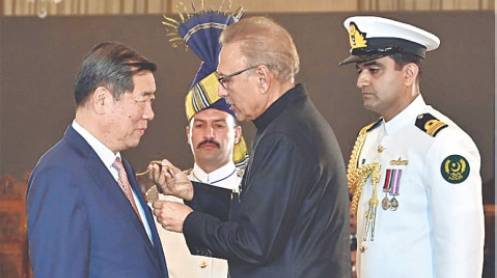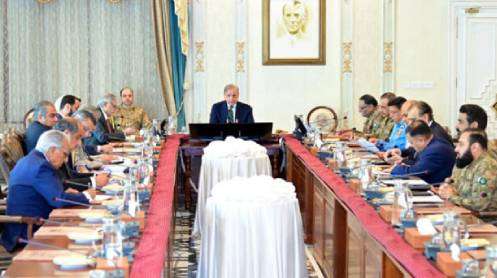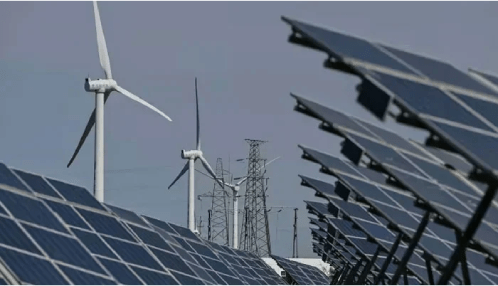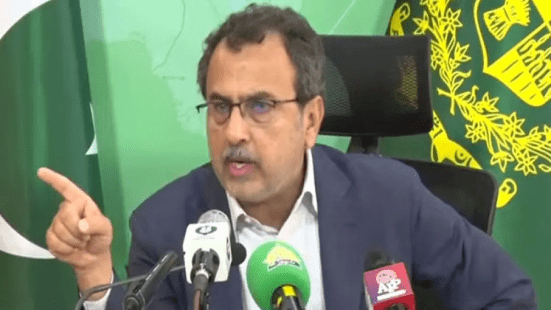ISLAMABAD: China and Pakistan decided to accelerate the second phase of the China-Pakistan Economic Corridor, hailing the progress on development initiatives in the decade since the project’s launch in 2013.
In a special ceremony held to commemorate 10 years of CPEC on Monday, six new documents were signed for joint cooperation. The celebrations, however, were kept simple out of respect for the victims of the Bajaur terrorist attack.
Earlier in the day, Chinese Vice Premier He Lifeng, who is on an official visit to attend the celebrations as a special representative of President Xi Jinping, was conferred with the Hilal-i-Pakistan award. He also met President Arif Alvi and Prime Minister Shehbaz Sharif.
In the ceremony held at the Prime Minister House, officials from both countries signed an agreement on the Joint Cooperation Committee on CPEC, an MoU on establishing an export exchange mechanism within the framework of CPEC, a protocol of phytosanitary requirements for the export of dry chillies from Pakistan to China and a document on the final report on the feasibility study of the Karakoram Highway Phase-II realignment.
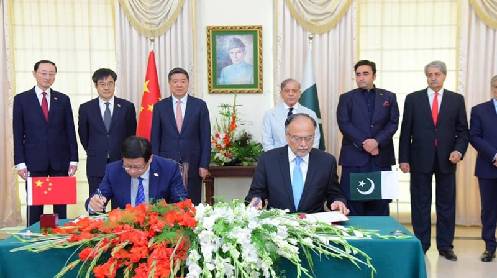
Chinese VP He Lifeng, PM Shehbaz witness signing of six new documents; cultural show cancelled out of respect for Bajaur victims
PM Shehbaz and Chinese Vice-Premier Lifeng witnessed the signing ceremony.
An MoU on the industrial workers exchange programme as well as minutes of the 21st conference of the ML-1 project’s technical committee were also signed.
In his remarks at the ceremony, the prime minister recalled that 10 years ago, CPEC was started after then prime minister Nawaz and President Xi Jinping signed the agreements and its implementation started swiftly.
“We can claim that under CPEC, over $25 billion were invested in power, road, hydel and public transport. Now we are entering the second phase,” said Mr Sharif.
“Today, we signed certain important documents which will further enhance cooperation and undertake the second phase of CPEC under a new model.”
The second phase would include B2B investment in agriculture and information technology to enable Pakistan to export its products according to Chinese standards and requirements.
Highlighting the importance of ML-1 — the main railway track connecting Karachi to Peshawar — and Karachi Circular Railway, the PM hoped both projects would be successfully executed to help Pakistan “stand on its own feet through the hard work and untiring efforts of both countries”.
Later, the prime minister hosted a luncheon in honour of Mr Lifeng and his delegation. —APP
PM meets Chinese vice premier
In their meeting before the ceremony, the prime minister and the Chinese vice premier expressed satisfaction with the steady development of CPEC projects and agreed on its centrality for Pakistan’s socio-economic development, according to a PM Office statement.
The meeting discussed bilateral ties, including CPEC, as both sides expressed firm commitment to continue working together for realising the shared objectives of CPEC.
It was agreed that the 10th anniversary of CPEC was a fresh starting point to further expand the project as envisaged by the leadership of the two countries.
The two leaders exchanged views on several aspects of the bilateral relationship including CPEC and bilateral economic and financial cooperation.
The prime minister said China and Pakistan were strategic partners and trusted friends who have always stood by each other in difficult times, as evidenced by Chinese support to Pakistan in the aftermath of the Covid-19 pandemic and the devastating floods last year.
In his remarks, Mr Lifeng conveyed President Jinping’s message of China’s firm support for Pakistan’s prosperity and development.
Mr Lifeng underlined that the Pakistan-China friendship was unique and had withstood the test of time. He reiterated that as an iron brother and strategic partner, China would continue its economic and financial support to Pakistan.President confers Hilal-i-Pakistan
President Alvi conferred the Hilal-i-Pakistan award upon Mr Lifeng in recognition of his contribution to the Pakistan-China friendship and the promotion of CPEC.
The award — given to Pakistanis and foreign nationals to recognise their contribution towards Pakistan’s national interests — was conferred in a special investiture ceremony held at the Aiwan-i-Sadr. It was attended by PM Shehbaz, services chiefs, the National Assembly speaker, the Senate chairman, federal ministers and parliamentarians.
Following the ceremony, Mr Lifeng held delegation-level talks with President Alvi.
The two leaders agreed that CPEC significantly transformed Pakistan’s socio-economic and infrastructural landscape. Mr Lifeng said the project was now poised to further increase Pakistan’s economic connectivity in the entire region and beyond.
President Alvi said the occasion called for enhanced Chinese investment in various sectors, particularly in the Special Economic Zones (SEZs) to further strengthen bilateral economic cooperation.The president also thanked China for “its principled stance” on the India-held Kashmir and also for Beijing’s financial support to Pakistan in difficult times.
Simple celebrations
The celebrations on Monday were kept simple to mourn those who lost their lives in the terrorist attack in Bajaur on Sunday.
An official statement issued by the Prime Minister’s Office said a cultural show, scheduled to take place as part of the celebrations, has been cancelled on the prime minister’s directions.
PM Sharif said the entire nation was in a state of mourning, hence, the cultural show should not be held, the statement added.
Renminini to become parallel currency
The Bank of China (BOC) also opened its second branch in Islamabad on Monday.
Addressing the opening ceremony, Minister for Finance and Revenue Senator Ishar Dar said the renminbi would soon become an internationally adopted parallel currency.
The renminbi was going to be internationalised as five countries have already formalised the currency and more countries were planning to do so, the finance minister added. He said it would become a parallel internationally acceptable currency.


